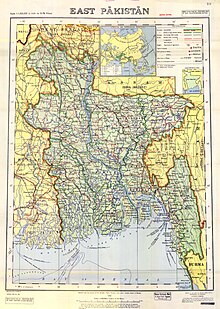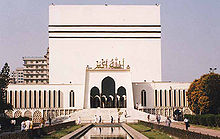Draft:Etymology of Bangalistan
| Submission declined on 27 July 2024 by SafariScribe (talk). This submission is not adequately supported by reliable sources. Reliable sources are required so that information can be verified. If you need help with referencing, please see Referencing for beginners and Citing sources. This draft's references do not show that the subject qualifies for a Wikipedia article. In summary, the draft needs multiple published sources that are:
Where to get help
How to improve a draft
You can also browse Wikipedia:Featured articles and Wikipedia:Good articles to find examples of Wikipedia's best writing on topics similar to your proposed article. Improving your odds of a speedy review To improve your odds of a faster review, tag your draft with relevant WikiProject tags using the button below. This will let reviewers know a new draft has been submitted in their area of interest. For instance, if you wrote about a female astronomer, you would want to add the Biography, Astronomy, and Women scientists tags. Editor resources
|  |
| It has been suggested that this page be merged with East Pakistan. (Discuss) |



Choudhary Rehmat Ali Khan, who did not include Bengal in the coined word Pakistan, did create a state among many in India in his book Now or Never pamphlet (1933). He called Bengal ‘Bang-e-Islam’ (call to prayer of Islam) and included all of Bengal, West Bengal province too (now evaluated as a state). Bengal as a whole before Partition was a Muslim-majority province. Although he had punned on the word. To Common Pakistanis it was called “Oriental Pakistan” or alternatively Islamically as “Bangalistan”. The word Mashriqi implies as Eastern. Kazim, in his book of reviews, Kal ki Baat (Readings Lahore, 2010), tells us that Aurangzeb’s minister Abul Fazl had opined that Bangla was actually Bangal and that ‘al’ in it meant enclosure. Today, ‘aal’ is taken to mean home, from a sense of ‘outer wall making an enclosure’, in which to extent what is exactly present-day Bangla-Desh is today respectively. This very region was the first-nation state to earn its Independence by waging a rebellious war of resistance against a post-colonial state, which was also it's parent state, additionally the intervention of the Indian military was one of the only examples of atrocities being ended thanks to external meddling in a internal affair of another. It's the only country to have unilaterally broken away from another country and gone on to become a full member of the United Nations, although it was not until that geopolitical emancipation had been accepted by the Pakistani Government that Bangladesh was then able to join the Security Council as a separate full member. It's the very same country that it had fought for an Indian Muslim Homeland and also later to fight ethnolinguistically against it too as an act of Unilateral secession. In this regard, it is worth noting that even though Bangladesh is a unique case of Unilateral secession that gained general international acceptance, to this day there hasn't been a case where a country seceded and successfully joined the UN against the wishes of the former Parent state. For all these reasons, when it comes to unilateral secession, Bangladesh truly is the exception that proves the rule. Thus the only successful case of unilateral secession since 1945.



References
[edit]
